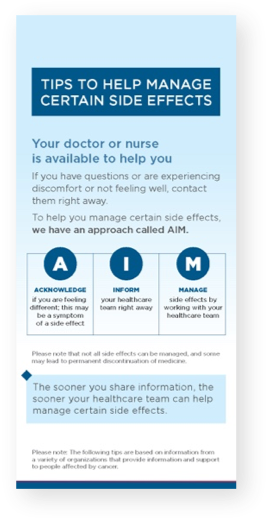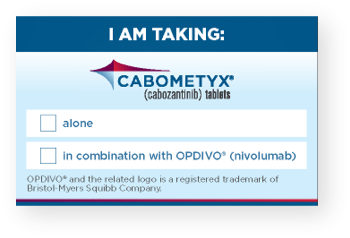What are the possible side effects of CABOMETYX?
CABOMETYX may cause serious side effects, including:
Bleeding (hemorrhage). CABOMETYX can cause severe bleeding that may lead to death. Tell your healthcare provider right away if you get any signs of bleeding during treatment with CABOMETYX, including:
- Coughing up blood or blood clots
- Vomiting blood or if your vomit looks like coffee grounds
- Red or black (looks like tar) stools
- Menstrual bleeding that is heavier than normal
- Any unusual or heavy bleeding
A tear in your stomach or intestinal wall (perforation) or an abnormal connection between 2 parts of your body (fistula). Tell your healthcare provider right away if you get tenderness or pain in your stomach area (abdomen) that is severe or that does not go away.
Blood clots, stroke, heart attack, and chest pain. Get emergency help right away if you get:
- Swelling or pain in your arms or legs
- Shortness of breath
- Feel lightheaded or faint
- Sweating more than usual
- Numbness or weakness of your face, arm, or leg, especially on one side of your body
- Sudden confusion, trouble speaking or understanding
- Sudden trouble seeing in one or both eyes
- Sudden trouble walking
- Dizziness, loss of balance or coordination
- A sudden severe headache
High blood pressure (hypertension). Hypertension is common with CABOMETYX and sometimes can be severe. Your healthcare provider will check your blood pressure before starting CABOMETYX and regularly during treatment with CABOMETYX. If needed, your healthcare provider may prescribe medicine to treat your high blood pressure. Tell your healthcare provider if you develop severe headaches, nose bleeds, tiredness or confusion, vision changes, chest pain, trouble breathing, irregular heartbeat, or blood in your urine.
Diarrhea. Diarrhea is common with CABOMETYX and can be severe. If needed, your healthcare provider may prescribe medicine to treat your diarrhea. Tell your healthcare provider right away if you have frequent loose, watery bowel movements.
A skin problem called hand-foot skin reaction. Hand-foot skin reactions are common and can be severe. Tell your healthcare provider right away if you have rashes, redness, pain, swelling, or blisters on the palms of your hands or soles of your feet.
Protein in your urine and possible kidney problems. Symptoms may include swelling in your hands, arms, legs, or feet. Your healthcare provider will check you for this problem during treatment with CABOMETYX.
Severe jaw bone problems (osteonecrosis). Your healthcare provider should examine your mouth before you start and during treatment with CABOMETYX. Tell your dentist that you are taking CABOMETYX. It is important for you to practice good mouth care during treatment with CABOMETYX. Tell your healthcare provider right away if you develop any symptoms of jaw problems, including: jaw pain, toothache, or sores on your gums.
Wound healing problems. Wound healing problems have happened in people who take CABOMETYX. Tell your healthcare provider if you plan to have any surgery before or during treatment with CABOMETYX.
- You should stop taking CABOMETYX at least 3 weeks before planned surgery.
- Your healthcare provider should tell you when you may start taking CABOMETYX again after surgery.
Reversible posterior leukoencephalopathy syndrome (RPLS). A condition called reversible posterior leukoencephalopathy syndrome can happen during treatment with CABOMETYX. Tell your healthcare provider right away if you have headaches, seizures, confusion, changes in vision, or problems thinking.
Change in thyroid function. CABOMETYX can cause changes in your thyroid function, including changes to thyroid hormone levels in your blood. Your healthcare provider will do blood tests to check your thyroid function before and during treatment with CABOMETYX.
Decreased calcium level in your blood (hypocalcemia). CABOMETYX can cause you to have a decreased amount of calcium in your blood. Your healthcare provider will do blood tests to check you for this problem and give you calcium if needed. Tell your healthcare provider right away if you get any of the following signs or symptoms:
- Muscle stiffness or muscle spasms
- Numbness or tingling in your fingers, toes, or around your mouth
- Seizures
- Sudden weight gain
- Swelling of your arms, hands, legs, and ankles
Your healthcare provider may change your dose, temporarily stop, or permanently stop treatment with CABOMETYX if you have certain side effects.
The most common side effects of CABOMETYX include:
- Tiredness
- Decreased appetite
- Nausea and vomiting
- Weight loss
- Constipation
CABOMETYX may cause fertility problems in females and males, which may affect your ability to have children. Talk to your healthcare provider if you have concerns about fertility.
These are not all of the possible side effects of CABOMETYX. Call your doctor for medical advice about side effects. You may report side effects to FDA at 1-800-FDA-1088 or www.fda.gov/medwatch.
Before you take CABOMETYX, tell your healthcare provider about all of your medical conditions, including if you:
- Have had a liver problem other than liver cancer.
- Have a recent history of bleeding, including coughing up or vomiting blood, or black tarry stools.
- Have an open or healing wound.
- Have high blood pressure.
- Have a low calcium level in your blood (hypocalcemia).
- Plan to have any surgery, dental procedure, or have had a recent surgery. You should stop treatment with CABOMETYX at least 3 weeks before planned surgery.
- Are pregnant, or plan to become pregnant. CABOMETYX can harm your unborn baby.
- If you are able to become pregnant, your healthcare provider will check your pregnancy status before you start treatment with CABOMETYX.
- Females who are able to become pregnant should use effective birth control (contraception) during treatment and for 4 months after your final dose of CABOMETYX.
- Talk to your healthcare provider about birth control methods that may be right for you.
- If you become pregnant or think you are pregnant, tell your healthcare provider right away.
- Are breastfeeding or plan to breastfeed. It is not known if CABOMETYX passes into your breast milk. Do not breastfeed during treatment and for 4 months after your final dose of CABOMETYX.
Tell your healthcare provider about all the medicines you take, including prescription or over-the-counter medicines, vitamins, and herbal supplements. CABOMETYX and certain other medicines may affect each other, causing side effects.
What should I avoid while taking CABOMETYX?
Avoid drinking grapefruit juice, eating grapefruit, or taking supplements that contain grapefruit or St. John’s wort during treatment with CABOMETYX.
Please see the Patient Information in the full Prescribing Information.










